I don’t go out to movies on my own very often, but it seems like there are a few movies I want to see that I know my friends wouldn’t pay money to see. So, I walk down to the theatre and get my ticket and popcorn for one. I’ve seen some good films, and also some duds. What kind of movies? Year of the Dog where a woman tries to change the lives of those around her by bringing the plight of animals to the attention of all who will listen. The Mountie which used the poetry of Robert Service and the beauty of the Yukon to tell the story of a Mountie to rides into town and cleans it up. Also, Meek’s Cutoff where a group in a wagon train decides to follow Meek as a guide and ends with the group hungry, thirsty, and lost in the middle of nowhere with no hope. But one of the best has been The Homesman.
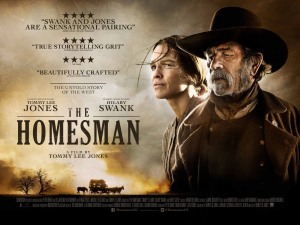
Source: http://www.thehollywoodnews.com/2014/08/07/must-watch-tommy-lee-jones-stars-directs-in-uk-trailer-for-the-homesman/
Tommy Lee Jones co-writes (adaptation from Glendon Swarthout’s novel), directs, produces, and stars in this film that shows the journey of three women–wives and mothers–who are mentally broken and sent back across the prairie East to their families. The West was not a friendly place for women. Isolation. Hard work. Abusive husbands. Lack of opportunities. Little to no support. These women needed to be strong, psychically, mentally, and emotionally. Yet, what happened to those women who were not able to thrive in the frontier conditions? Tommy Lee Jones shows, in sometimes painful and disturbing ways, the lives of some of these frontier women. Of the three women who are locked up and sent back East, one of them is only 19 and had already had three babies die. And even for the women who did survive in the West, there were little opportunities. The woman who agrees and volunteers to drive these three women across the prairies is 31 years old, single, owns her own land, farms her land, and yet no man will marry her because they want to go back East for a wife. The inequality of power in the West is highlighted in Tommy Lee Jone’s haunting film.
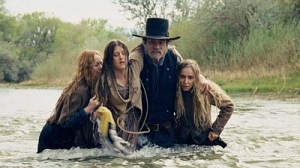
Source: http://nameofthesong.blogspot.ca/2014/09/the-homesman-us-trailer-song-music.html
In an interview about the movie, Hilary Swank (who plays the role of the woman who volunteers to bring the women East) says, “This movie is a feminist movie because it really deals with the objectification and trivialization of women. It takes place in the middle of the 1800s and it’s dealing with issues we still deal with today.” Inequality of power and objectification are major issues in today’s society and the film highlights the destructive nature of that power hierarchy through the lives of three women who go crazy and are sent away to be dealt with. The most striking character is that played by Hilary Swank. Mary Bee Cuddy is constantly being told in the film that she is ‘bossy.’ Her plans to expand her farm and better the quality of her life (like buying a piano) are tolerated by the frontier community of Loup, yet she is not accepted. In at least one scene, she is rejected as a wife because she is bossy and that the man wants to go East to find a proper wife. Mary Bee is intelligent, strong, and lonely. Yet in the West, there is no place for a woman on her own or a strongly independent woman. The men of the West seek to hold onto their power and in some cases use and destroy the women around them in order to assert their power. In her book Captive Bodies: Postcolonial Subjectivity in Cinema, Gwendolyn Audrey Foster writes, “for the moment, the central factor behind the current lack of feminist westerns is best described by B. Ruby Rich: ‘the basic dilemma facing anyone intent on fashioning a mainstream version of the female western is obvious: how to find a way to give women as much power as men’ (22)” (pg 99). In the case of The Homesman, Mary Bee Cuddy has equal opportunities and power on paper, yet in the society in which she lives, she will never been taken seriously.
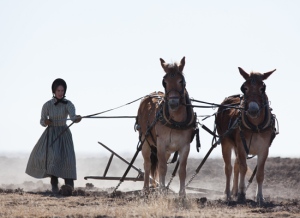
Source: http://blogs.whatsontv.co.uk/movietalk/page/3/
In an interview, Tommy Lee Jones says his intentions weren’t to make a feminist western, but he does say this: “I’m a humanist, but my grandmother, mother, wife and daughter are all female, and I like those people. I’m a feminist but that is not all I am.” Humanist. Tommy Lee Jones writes a script about power inequality as it relates to women, the mentally ill, and those who do not follow the strict codes set out by society. Clearly this is a film that grapples with issues which Hollywood is eager to take on; the cast includes big names like Tommy Lee Jones, Hilary Swank, James Spader, John Lithgow, Jesse Plemons, William Fichtner, and Meryl Streep. True, the women do not triumph in the film and in the end, the men are the ones with the power and the control over life, yet The Homesman strays from the celebration of male heroism and focuses on the dangers of unchecked discrimination within a society.
Another western that seeks to show that intelligent, independent women did exist in the Wild West is the CBC’s new show Strange Empire. In an attempt to force women into prostitution, a man has his gang kill several men looking to settle near the Alberta-Montana border and blames the murders on the Natives in the area. The show includes a Metis woman who is strong and a capable leader and a female medical doctor from Toronto on a honeymoon gone wrong. As they try to survive and get used to life without their husbands and fathers around, the make-shift town run by these women shows that the power balance can be upended. The show highlights the dangers of a society in which men discriminate and oppress women, Natives, and anyone who is not seeking power and wealth.
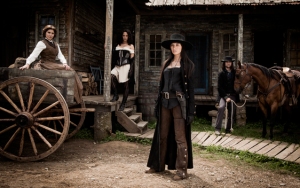
Source: http://www.cbc.ca/mediacentre/strange-empire.html#.VKSHuCvF-9Y
I truly enjoyed The Homesman because it showed a woman, Mary Bee Cuddy, who was not a tomboy or presented in a masculine way and followed her life as she struggled to survive and thrive in a society and a time in history which was controlled and dominated men. It was not an easy film to watch and seeing it alone left me feeling a little blue, yet I am glad I decided to venture out on my own. Times have changed, yet films like The Homesman remind us that as a society, we have a ways to go before we reach equality.
“Politicians should read science fiction, not westerns and detective stories.” (Arthur C. Clarke)
“Love the Lord your God with all your heart and with all your soul and with all your mind and with all your strength. The second is this: Love your neighbor as yourself. There is no commandment greater than these.” (Mark 12:30-31)
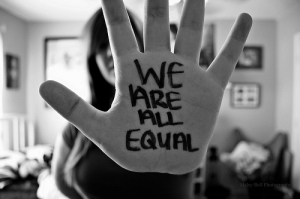
Source: https://www.flickr.com/photos/haleyelise/4040072237/?rb=1